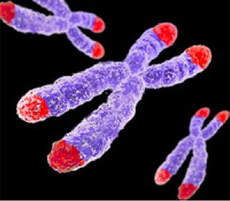Quick anatomy lesson: The human body is composed of organs—which are composed of tissue—which are composed of cells—which perform different functions.
Cells number 10 trillion to 100 trillion in an adult. In the nucleus of cells are chromosomes. Picture a chromosome as a double-twisted shoelace. The plastic tip at the end of the shoelace is the telomere.
Telomeres allow cells to divide accurately. Cell division is necessary to replace the billions of cells that die everyday. With each cell division, telomeres shorten.
Ta da—end of lesson.
Why are telomeres important?
Because when telomeres become too short, there is no cell division and the cell dies. No new cells = no rejuvenation of body parts. Lots of shortened telomeres = accelerated aging and health problems (like diabetes, heart disease, and cancer).
Dr. Elizabeth Blackburn, a molecular biologist at the University of California, has studied cellular function for over thirty years. She received the Nobel Prize in 2009 for her work on telomeres.
In a lecture at Santa Clara University earlier this year, Dr. Blackburn stated that childhood traumas and ongoing stress contribute to shortened telomeres.
Likewise, an article in Scientific American last month reported on a long-term study of children from Romanian orphanages that was published in Molecular Psychiatry. One of the findings: the longer a child spends in an orphanage, the shorter the telomeres because of the stressful environment.
But here’s good news. There is an antidote to shortened telomeres.
When Dr. Blackburn was asked what was the one thing that could lengthen telomeres, she answered, “Exercise.” In addition she said that contemplative practices—such as meditating or praying—might also increase telomere length.
We are not doomed! We can improve our longevity and quality of life with our lifestyles. And I’m pretty sure we’ve all heard that exercise/stress management/contemplative formula before.

So be kind to your telomeres. Take them out for a walk. Give them some peace of mind. And have a better life—on a molecular level and overall as well.
Dr. Blackburn’s research:
http://nobel.ucsf.edu/nobel/2009/blackburn/ucsf-elizabeth-blackburn-nobel-prize-physiology-medicine/

Great advice that I can take now that things are settling down! I promise I’ll start to walk this week. And get back to meditating. Thanks for the reminder and one more good reason.
I shared this blog on Facebook . I saw an episode of Dr. Oz (Oprah’s buddy) on this very subject. I totally AGREE !!!!! I need to get walking again. I’ve been slacking. Perhaps watching Wimbledon while on the treadmill would be a “FAN”tastic idea !!!!!
. I saw an episode of Dr. Oz (Oprah’s buddy) on this very subject. I totally AGREE !!!!! I need to get walking again. I’ve been slacking. Perhaps watching Wimbledon while on the treadmill would be a “FAN”tastic idea !!!!!
Yes, you should “friend” telomeres on FB!